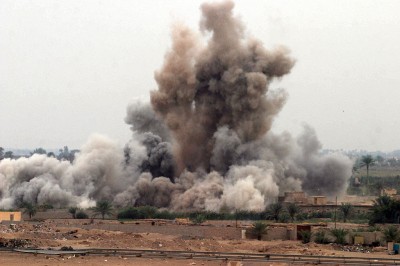War Works, So Why Isn’t It Working against the Islamic State (ISIS)?

On November 16, ABC World News anchor CeciliaVega asked this question:
Martha, these numbers they are absolutely staggering: About 800 airstrikes so far against ISIS. Why isn’t this working?
What makes a seemingly innocuous question like that noteworthy is the assumption that airstrikes are supposed to “work” in the first place.
One doesn’t need to have a deep understanding of military history to know that this assumption is flawed, to say the least. There were more than 29,000 bombs dropped on Iraq in just the first month of the invasion in 2003, along with a massive ground invasion. Yet this devastating violence did not “work” to eliminate resistance to the US occupation. The same could be said for Afghanistan.
The answer to Vega’s question, from correspondent Martha Raddatz, suffers from a similar flaw:
Well, these airstrikes, which have cost about $1 million per airstrike, are meant to hold back ISIS from taking over more towns, more territories. And they have had some success with that–look at the city of Erbil. But that is a temporary fix. You will need ground troops, Iraqi ground forces and Syrian rebel ground forces, to try to do anything more.
Again, the “need” for ground troops to “do anything more” is a given–if one wants to see success in defeating ISIS, one must be willing to carry out more violence. Reporters like Raddatz would likely tell you that they’re not expressing an opinion about policy, but are simply conveying an obvious truth about what it would take to defeat ISIS.
But comments like this are a sign of how war is normalized, where the default option for combating violence is to commit other acts of violence. And this isn’t the first time. Back in 2011, Afghan government officials were condemning a NATO airstrike that killed civilians, and Raddatz went on the air to defend such attacks (FAIR Blog, 6/6/11):
I mean, they simply have to carry out airstrikes over there. It’s a very rapid response. It’s real-time intelligence. It’s certainly flawed at some points.
But I’ve been on these missions. I’ve been on a combat mission in a fighter jet. I’ve seen all the very, very careful steps they take…. I think you will see a real fight over these restrictions, but the airstrikes and these night raids just simply have to continue if they’re going to go after the enemy.
“They simply have to carry out airstrikes over there.” If that’s your attitude, why would you want to have anyone on who thinks there’s a different way to solve problems?

